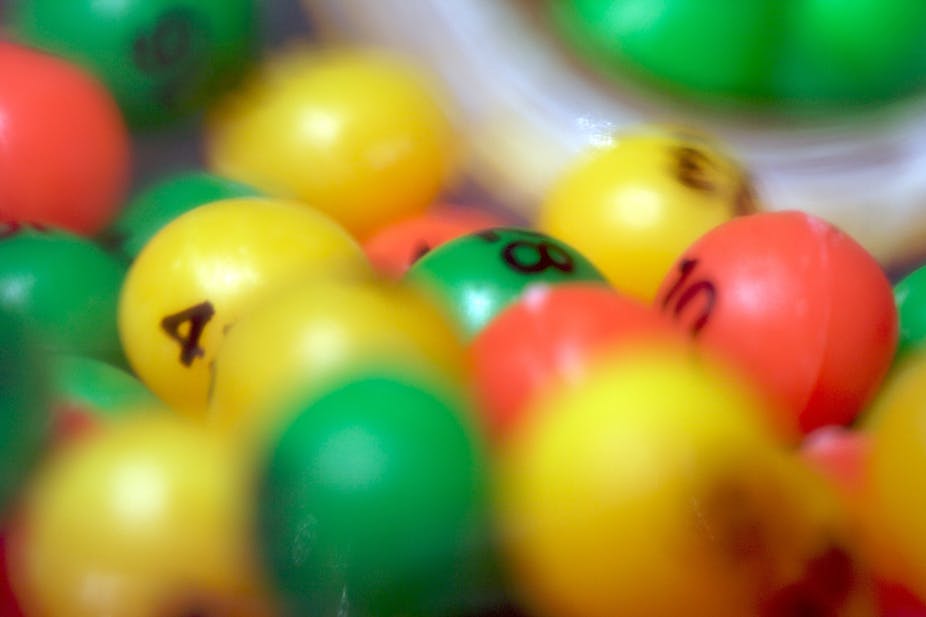It could still be you – it’s just less likely to be. The UK’s National Lottery last week added ten more balls to its bi-weekly Lotto game. Instead of picking six numbers from 49, players must now choose six numbers from 59. This led some of the weekend papers to call the game “controversial” and a “rip off” highlighting the fact that the odds of winning the jackpot on Lotto have now increased from 1 in 14m to 1 in 45m.
But will it really stop people buying a ticket? Probably not. In fact, the probability of winning the jackpot is just one of many factors that help determine whether potential players will take a punt.
When it comes to any gambling activity, there’s lots to consider. You might weigh up the price to play, the size of the jackpot, the number and value of any smaller prizes, the probability of winning them, the speed of the game, how quickly you will receive your winnings, the ease of playing the game, whether the game is based on chance or requires some skill and whether you have multiple chances to gamble on a single event. In short, gambling might feel like a gut instinct or a frivolous whim, but a complex set of decisions must be made whenever we pick our numbers or take a punt on a horse.
Balls in the air
Yes, the changes made to Lotto may result in a slight dip in overall initial sales, but over time, they are likely to return to levels seen before the addition of the extra balls.
This is partly because the overall chance of winning any prize has increased from 1 in 54 to 1 in 9.3. Additionally, there will be more guaranteed millionaires and likely more rollovers – which generally result in higher sales.
Of course, the chance of winning the Lotto jackpot is now an incredible one in 45m. But does that make playing it a tribute to public innumeracy and totally irrational? Not necessarily.
Lotto still offers a low-cost chance of winning a very large, life-changing amount of money. Many psychologists – and the odd economist – would argue that playing Lotto is entirely rational behaviour given the small cost involved; it’s a small price to pay for a big hope.

Besides, we know that most players don’t think about the probability of winning but instead concentrate on the amount that could be won – the jackpot size. Just look at EuroMillions. The odds of winning the top prize in that game are 1 in 116m, but tens of millions are still willing to play.
The curse of positivity
The simple truth is that jackpot size is one of the most important factors in determining whether people will play – and decreasing the odds in this case won’t change that.
Besides, in general we tend to overestimate positive outcomes and underestimate negative ones. Tell someone that they have a 1 in 45m chance of being killed by the end of the day and chances are that they will hardly give it a second thought. Give them the same probability of winning Lotto, however, and they suddenly will become over-optimistic (“It could be you!”).

There are other factors at work, too. In 2013, for example, when the price of buying a Lotto ticket doubled from £1 to £2, Camelot – the company behind the National Lottery games – softened the blow by increasing the amount that could be won for matching three numbers from £10 to £25. This appeared to help bolster sales. Besides, from a money-making perspective, if Camelot’s customers do feel that the Lotto odds are too remote to play, there are plenty of other games in the National Lottery portfolio for them to choose from.
The media also plays a part. By providing widespread coverage of the few huge winners, it helps us forget the millions of people who lost.
It’s also worth remembering that many regular players, who choose the same numbers every week, are already essentially “entrapped”, fearing that the one week they don’t play will be the week their numbers will come up. It is unlikely that many of them will quit now.
The bottom line is that Camelot will have done its homework. Major decisions such as this are about increasing profits and if people do walk away in their masses then a return to the 49-ball version will be inevitable. But such a walk-out is unlikely to happen.
Whether the players are eternal optimists, blinded by the sheer size of the jackpot, or whether they are trapped into playing the same numbers just in case, my guess is that most current Lotto players will be able to ignore a change that only makes already extraordinarily long odds all the more extraordinary.

